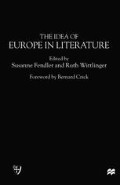Abstract
As George Uscatescu asserted in ‘Autopresentazione’, a self-presentation requested by the Italian journal Filosofia Oggi on his 70th birthday, his life was conducted in the name of unity between profession and calling.1 Inspired by Max Weber’s view, expressed in his Politik als Beruf, professor and writer George Uscatescu understood this unity in a different way: as referring not to politics, but to philosophy, that is to the ‘practice of “logos” in the most profound possible sense’. The best expressions of his concern with the ‘vitality’ of logos, especially of the cultural logos, are his ten books and many papers, written in various languages, dedicated to the theme of Europe. Well-known as a European humanist, he never forgot his roots; he wrote a few books, many essays, and almost all of his poetry in Romanian. He pleaded and worked for the integration of his native country’s culture in Europe, with the condition that its own identity be preserved.
Access this chapter
Tax calculation will be finalised at checkout
Purchases are for personal use only
Preview
Unable to display preview. Download preview PDF.
Notes
George Uscatescu, ‘Autopresentazione’, Filosofia Oggi 12.3/4 (1989): pp. 393–405 (All quotations are translated into English by the author of this chapter.)
Jorge Uscatescu, Proceso al humanismo (Madrid: Guadarrama, 1968).
George Uscatescu, ‘Heidegger e il suo secolo’, Destin 21–23 (1971): pp. 10–20, here p. 17.
Constantin Noica, ‘El continente mental trazado por Jorge Uscatescu’, Cultura y existencia humana: Homenage al profesor Jorge Uscatescu, ed. Jose Antonio Merino (Madrid: Reus, S.A., 1985), p. 257.
George Uscatescu, La mort de l’Europe? (Paris: Librairie Française, 1957), p. 109.
Jorge Uscatescu, Europa ausente (Madrid: Editora Nacional, 1953), p. 114.
Jorge Uscatescu, Maquiavelo y la Pasion del Poder (Madrid: Guadarrama, 1969).
Jorge Uscatescu, Erasmo (Madrid: Editora Nacional, 1969).
George Uscatescu, ‘Machiavelli si pasiunea puterii’, Proces umanismului (Bucharest: Editura politica, 1987), p. 141.
George Uscatescu, Erasmus (Bucharest: Editura Univers, 1982), p. 95.
Ibid., p. 20.
Jorge Uscatescu, Europa, nuestra utopia (Madrid: Reus, S.A., 1978).
George Uscatescu, ‘Europa, utopia noastra’, Proces umanismului (Bucharest: Editura politica, 1987), p. 291.
Ibid., p. 297.
‘Cuvant inainte’, Destin 1 (1951): pp. 3–8.
Mircea Eliade, ‘Popas la cincisprezece ani’, Destin, Volum comemorativ, Madrid (1966): pp. 13–4, here p. 13.
George Uscatescu, ‘Este posibila intoarcerea?’ Destin 24/25 (1972): pp. 3–8.
George Uscatescu, Nou itinerar (Madrid: Destin, 1968).
Jorge Uscatescu, Nemesis y libertad (Madrid: Editora Nacional, 1968).
George Uscatescu, Brancusi si arta secolului (Bucharest: Editura Meridiane, 1985), p. 28.
Leo Spitzer, ‘L’Archétype de la ballade Miorita et sa valeur poétique’, Cahiers Sextil Puscariu (University of Washington, Seattle) 2.2 (1953): pp. 95–120, here p. 95.
George Uscatescu, Thanatos (Madrid: Destin, 1970), p. 9.
George Uscatescu, Darimat Ilion (Madrid: Destin, 1972).
George Uscatescu, Melc sideral (Madrid: Destin, 1974).
George Uscatescu, Memoria padurii (Madrid: Destin, 1977).
George Uscatescu, Millenarium (Madrid: Destin, 1980).
George Uscatescu, Autobiografie (Madrid: Destin, 1985).
George Uscatescu, Luceafarul: la un centenar (poem dramatic in proza) (Madrid: Destin, 1989), p. 69.
K. Wilson and J. van der Dussen, eds, What is Europe?: The History of the Idea of Europe (London and New York: Routledge, 1995), p. 9.
Editor information
Editors and Affiliations
Copyright information
© 1999 Palgrave Macmillan, a division of Macmillan Publishers Limited
About this chapter
Cite this chapter
Mihut, L. (1999). A Romanian View of Europe: George Uscatescu. In: Fendler, S., Wittlinger, R. (eds) The Idea of Europe in Literature. Palgrave Macmillan, London. https://doi.org/10.1007/978-1-349-27496-3_9
Download citation
DOI: https://doi.org/10.1007/978-1-349-27496-3_9
Publisher Name: Palgrave Macmillan, London
Print ISBN: 978-1-349-27498-7
Online ISBN: 978-1-349-27496-3
eBook Packages: Palgrave Literature & Performing Arts CollectionLiterature, Cultural and Media Studies (R0)

